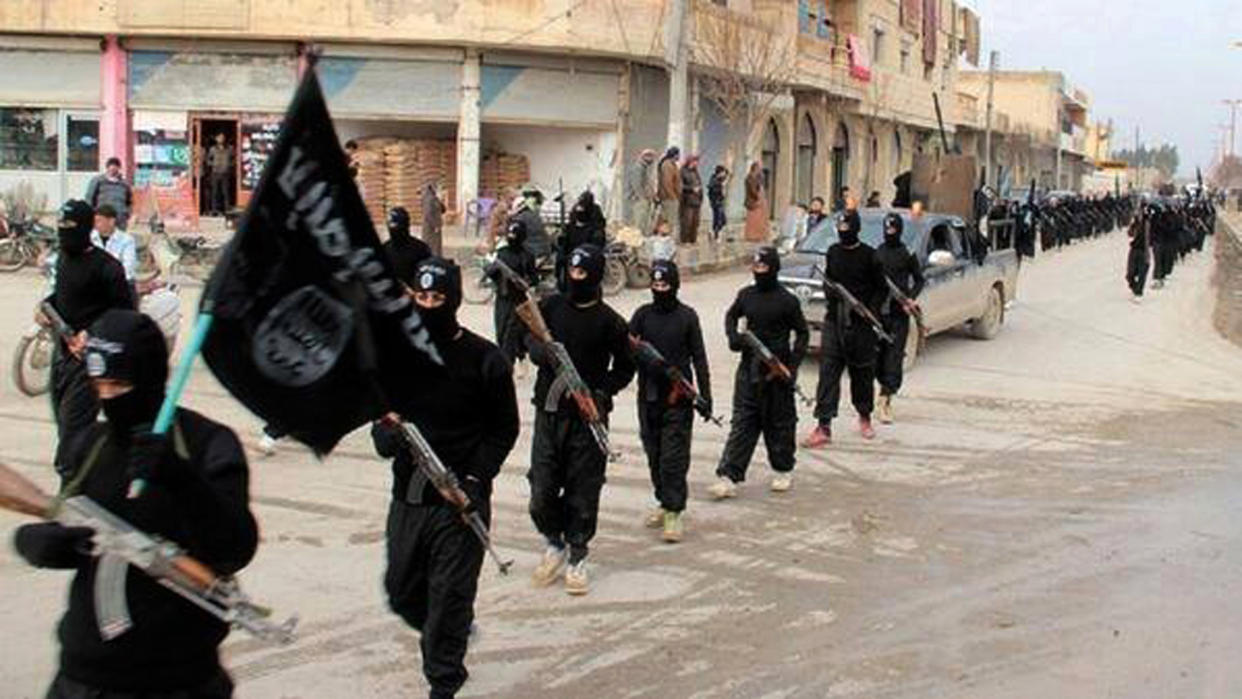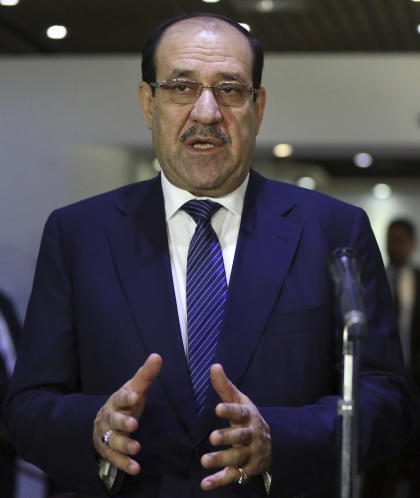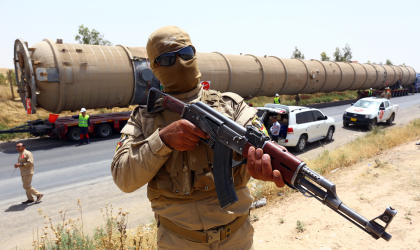Other crises muscle onto world stage just as Iraq is coming undone
Situation in Baghdad is so dire, top military leaders said to have bags packed ready to flee

While the Obama administration and much of the global media focused on crises in Ukraine and the Gaza Strip in recent weeks, the centrifugal forces of a sectarian civil war continued to pull Iraq apart. The political deadlock in Baghdad persists, Iran’s grip on the government there has tightened and the Kurds are pushing ahead with a referendum on independence. With Iraqi Security Forces increasingly in disarray, the extremists of the Islamic State of Iraq and the Levant (ISIL) have begun probing the defenses of the capital with a wave of lethal car-bomb attacks in the past week, some of them targeting police checkpoints on major routes into the city.
So dire is the situation in Baghdad that a knowledgeable source there says that top Iraqi military leaders “have their bags packed” in anticipation of possibly having to flee the capital with their families.
Reports over the weekend that Prime Minister Nouri al-Maliki’s Dawa Party is considering abandoning him as its candidate represent the one bit of hopeful news out of Iraq in recent weeks. When Iraq’s most revered Shiite religious figure, Grand Ayatollah Ali al-Sistani, called earlier this month for a new government in Baghdad that has “broad national acceptance,” Iraqis understood that he was signaling to the divisive al-Maliki to finally step aside for the good of the country. In his eight years as leader, al-Maliki has consistently pursued a sectarian agenda that alienated Iraq’s Sunni minority and drove Sunni tribes once allied with the United States into the arms of the extremists of ISIL (also called ISIS). That uneasy alliance is behind ISIL’
s lightning offensive last month that overran the border between Syria and Iraq and captured the Sunni-majority regions of the country, including major northern cities such as Mosul and Tikrit.
On Saturday the Dawa Party reportedly sent a senior official to Najaf with a message to Sistani that it was finally willing to replace al-Maliki if necessary. Yet the Iraqi strongman has survived many political crises in the past, and in his years in office Maliki has ruthlessly gathered the reins of power, including control over the Iraqi Security Forces and ministries of Defense and Interior.
“Every day the political deadlock continues bolsters al-Maliki’s chances of staying in power, because as the incumbent and acting prime minister, he will continue making the argument that only he is capable of forming a government and keeping the Shiite coalition intact,” said Kenneth Pollack, a senior fellow at the Center for Middle East Policy at the Brookings Institution, and a former senior CIA Middle East analyst. “History has shown that argument is very persuasive to Iran in particular.”
Indeed, as the crisis has deepened, Iran has cast a lengthening shadow over Iraq, with legendary Iranian Quds force Commander Qassem Suleimani having flown to Baghdad last month to rally the Shiite militias who now dominate Iraqi Security Forces, and to take charge of Iraqi defenses. A knowledgeable source says that Iranian pilots are now flying the Su-25 fighter jets that Tehran and Moscow rushed to Iraq, which have already conducted more than 40 missions inside Iraq. Because the Su-25s can fly only daytime missions and lack precision-guided weapons, however, their attacks on ISIL forces have led to significant collateral damage to civilians, further inflaming Sunni tribes united in their hated of Tehran.
In top-level government meetings in Baghdad, a senior Quds force commander from the Iranian Revolutionary Guards Corps now sits shoulder-to-shoulder with Iraq’s top military officers. “That is how bad [Iranian interference] is now,” said a knowledgeable source in Baghdad, who asked to remain anonymous in order to speak candidly about private discussions.
As long as al-Maliki rules over a sectarian government in Baghdad that is seen as a stalking horse for Tehran, U.S. military leaders say, their options for coming to Iraq’s aid are limited. “The immediate task is to determine whether Iraq has a political future, because if Iraq has a political future, then we will work through Iraq to deal with the ISIS threat,” General Martin Dempsey, chairman of the Joint Chiefs of Staff, said July 24 at the Aspen Security Forum. If the Iraqi body politic cannot rally around an inclusive unity government — read one not led by al-Maliki — then the U.S. would have to find other regional partners, notably not including Iran.
Not only does Iran have the blood of many U.S. soldiers on its hands through its support of Shiite extremists in Iraq, said Dempsey, but it is supporting terrorist proxies throughout the Middle East. “It wouldn’t make sense to me to embrace a country, a nation-state, that is creating so many other problems.”
As for the Kurds in the north, a dispute over their attempts to independently sell oil led the government in Baghdad to withhold funds and stop paying Kurdish salaries many months ago. More recently Baghdad has even barred cargo flights that deliver much-needed weapons and ammunition to Kurdish peshmerga forces engaged in running battles with ISIL militants across a nearly 650-mile border. Kurdish officials are now pleading for the U.S. to provide direct military assistance. According to a senior Kurdish official, the Kurds will soon switch to the U.S. dollar as their official currency to make a clean break from the Iraqi dinar and the Baghdad government, and they plan to hold a referendum on independence within the next 30 days.
As the final guarantor of Iraqi sovereignty, Iraqi Security Forces have in some cases been co-opted by Shiite militias and also infiltrated by Sunni extremist informants tied to ISIL, according to a classified assessment of the ISF conducted by U.S. Special Operations Forces on the ground. Their assessment, which recently leaked to the New York Times and is still being studied at U.S. Central Command and the Pentagon, concluded that only half of Iraqi forces are operationally viable even with U.S. assistance. That assessment was bolstered a few weeks ago when Iraqi army units launched a counteroffensive to retake the city of Tikrit, and were repulsed by ISIL militants.
Few observers believe the Obama administration is willing to commit the resources or the military personnel necessary to reconstitute an ISF that has fallen into such disarray. “I’m hearing from my friends in the U.S. military that they could turn the ISF into a cohesive and viable force once again with enough retraining and mentoring, but it would mean taking ownership of that force like they did back in 2007,” said Pollack. “And no one I talk to thinks the White House wants to even hear that option.”
Meanwhile, in the past week ISIL militants overran a large Syrian military base on the outskirts of the city of Raqqa, capturing heavy weapons such as tanks, and launched a punishing wave of suicide car bombs into central Baghdad. The simultaneous offensives suggest that ISIL is less a terrorist organization at this point, and more of an unholy army intent on carving an Islamist caliphate out of the carcass of what was once Iraq and Syria.
“If you look where ISIS fighters have been heavily engaged in fighting in Syria and Iraq in recent weeks, the logic of their operations appears to be taking control of urban centers and the major roads that link them in order to delineate the borders of their caliphate,” said Jessica Lewis, research director at the Institute for the Study of War, and a former U.S. Army intelligence officer. “Their operations in the belts surrounding Baghdad and the recent wave of [car bomb] attacks in the city may be intended to pin ISF forces down in the capital so they cannot launch a counteroffensive to recapture ISIS-held territory, or they may be probing Baghdad’s defenses in anticipation of a larger offensive.
”
As the Pentagon methodically completes its assessment of the situation and the White House considers its unpalatable and risky options, the devolution of Iraq has already begun. The post-Iraq landscape now taking shape and already dimly visible includes a Shiite vassal state closely aligned with Tehran; a rump Kurdistan, landlocked and besieged; and a Sunni caliphate ruled by Islamist extremists who view beheadings, mass murder and the destruction of religious holy places as badges of honor. Time is running out to reverse that trajectory, and to rescue the legacy of “Operation Iraqi Freedom” that 4,500 American troops died, and more than 40,000 were maimed and wounded, trying to secure.





